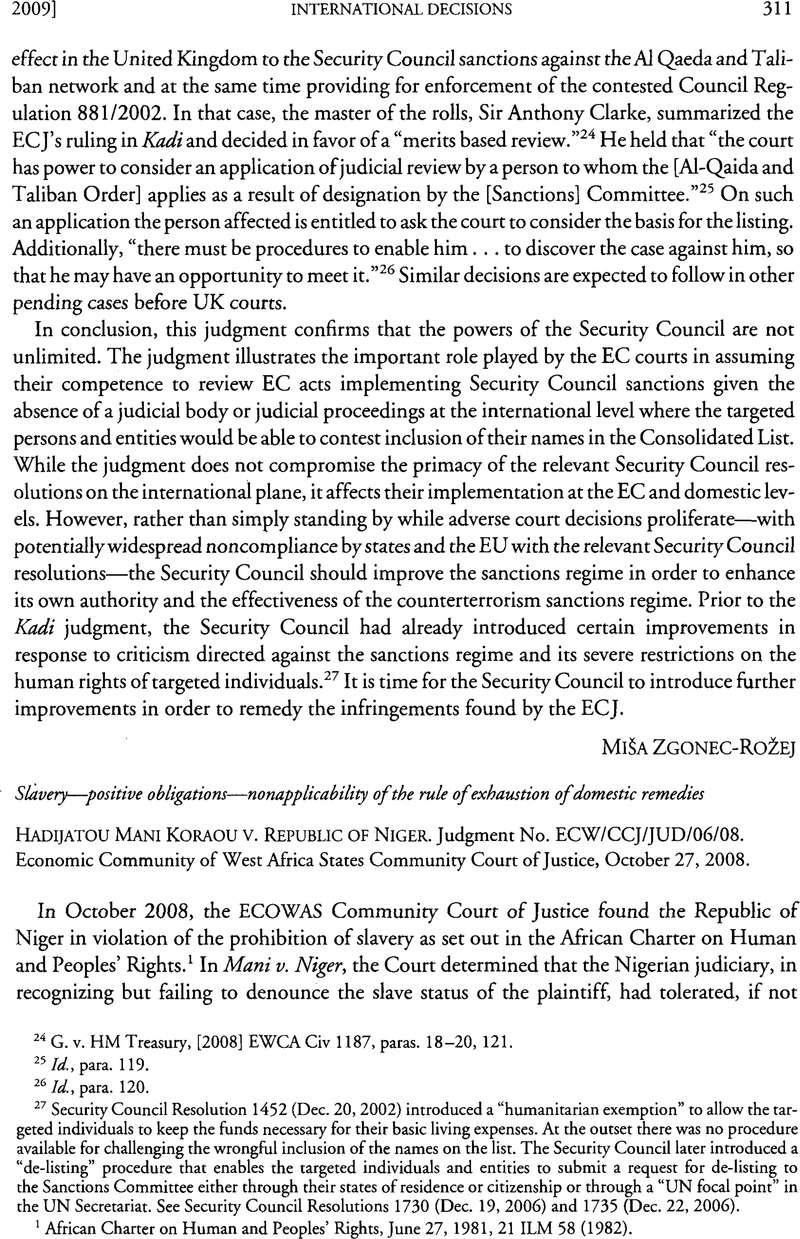Published online by Cambridge University Press: 27 February 2017

1 African Charter on Human and Peoples’ Rights, June 27, 1981, 21 ILM 58 (1982).
2 Hadijatou Mani Koraou v. La Republic de Niger, Arret No. ECW/CCJ/JUD/06/08, para. 11 (ECOWAS Cour de Justice Oct. 27, 2008), at <http://www.unhcr.org/refworld/docid/491168d42.html>. An unofficial translation into English is available at <http://www.unhcr.org/cgi-bin/texis/vtx/refworld/rwmain?docid=496b41fa2>.
3 See Treaty of the Economic Community of West African States, May 28, 1975, 1010 UNTS 17’, reprinted in 14 ILM 1200 (1975)
4 Revised Treaty of the Economic Community of West African States, Art. 3(1), (2), July 24, 1993, 35 ILM 660 (1996). The fifteen members of ECOWAS are Benin, Burkina Faso, Cape Verde, Côte d’Ivoire, Gambia, Ghana, Guinea, Guinea-Bissau, Liberia, Mali, Niger, Nigeria, Senegal, Sierra Leone, and Togo. Mauritania, an original member, withdrew its membership in 2000.
5 See Protocol A/P. 1/7/91 .Art. 9 (1991), 30 ILM 1241 (1991).
6 See Solomon T., Ebobrah, A Rights-Protection Goldmine or a Waiting Volcanic Eruption? Competence of, and Access to, the Human Rights Jurisdiction of the ECOWAS Community Court of Justice, 7 AFR. Hum. Rts. L.J. 307, 312–13 (2007)Google Scholar.
7 See Supplementary Protocol A/SP. 1/01/05 Amending the Preamble and Articles 1, 2, 9 and 30 of Protocol A/P. 1 /7/91 Relating to the Community Court of Justice and Article 4 Paragraph 1 of the English Version of the Said Protocol, Art. 3, Jan. 19, 2005, at <http://www.africancourtcoalition.org/content_files/files/HD14.doc>.
8 The ECOWAS Court consisted of three judges: the Honorable Justice Aminata Sanogo Malle of Mali (presiding), and Justices Awa Nana Daboya of Togo and El-Mansour Tall of Senegal.
9 De Wilde (“Vagrancy”) v. Belgium, 12 Eur. Ct. H.R. (ser. A) at para. 39 (1971).
10 Slavery is defined in Article 1(1) of the 1926 Slavery Convention, Sept. 25, 1926, 212 UNTS 17, which reads: “Slavery is the status of condition of a person over whom any or all of the powers attaching to the right of ownership are exercised.” See, e.g., Jean, Allain, The Definition of Slavery in International Law, 52 How. L.J. 239 (2009)Google Scholar.
11 Prosecutor v. Kunarac, No. IT-96–23/1-A, Judgment, paras. 118–19 (June 12, 2002).
12 The original quotation in French reads: “la mise hors la loi de l’esclavage est une obligation erga omnes qui s’impose a tous les organs de l’Etat.”
13 Quoting De Wilde, para. 55. In the ECOWAS decision, rendered in French, what is found in quotation marks reads: “conformément à l’évolution de la pratique international, les Etats peuvent bien renouncer au benefit de la régie de l’épuisement des voies de recours internes.” What the European Court actually said is:
rien n’empêche les Etats de renoncer au bénéfice de la règie de l’épuisement des voies de recours internes, qui a pour but essentiel de protéger leur ordre juridique national. Il existe à ce sujet une longue pratique Internationale a laquelle la Convention n’a sûrement pas entendu déroger car elle se réfère, en son article 26 [current article 35], aux principes de droit international généralement reconnus.
14 Article 26 (now Article 35) of the European Convention for the Protection of Human Rights and Fundamental Freedoms, Nov. 4, 1950, ETS No. 5, 213 UNTS 222, reads: “The Commission may only deal with the matter after all domestic remedies have been exhausted, according to the generally recognized rules of international law, and within a period of six months from the date on which the final decision was taken.”
15 In re Gallardo, Inter-Am. Ct. H.R. (ser. A) No. G 101/81 at para. 26 (July 15, 1981).
16 Prosecutor v. Kunarac, No. IT-96–23/1-T, Judgment, para. 541 (Feb. 22, 2001).
17 See supra note 10.
18 Article 5 of the African Charter on Human and Peoples’ Rights, supra note 1, reads: “Every individual shall have the right to the respect of the dignity inherent in a human being and to the recognition of his legal status. All forms of exploitation and degradation of man particularly slavery, slave trade, torture, cruel, inhuman or degrading punishment and treatment shall be prohibited.”
19 See, for instance, Article 8 of the International Covenant on Civil and Political Rights, Dec. 19, 1966, 999 UNTS 171.
20 The original quotation, in French, reads: “la mise hors la loi de l’esclavage est une obligation erga omnes qui s’impose à tous les organs de l’Etat.”
21 Barcelona Traction, Light and Power Co. (Belg. v. Spain), Second Phase, 1970 ICJ Rep. 3, para. 34 (Feb. 5).
22 See, e.g., Sandra, Fredman, Human Rights Transformed: Positive Rights and Positive Duties (2008)Google Scholar.